Antioquia's Emergence as a US Priority in the Region
Understanding the region's new strategic significance
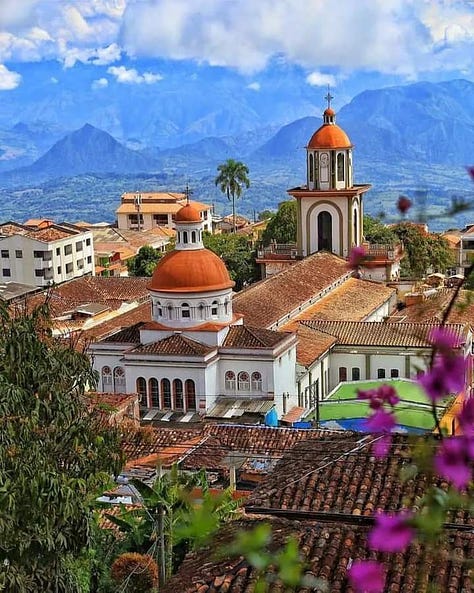
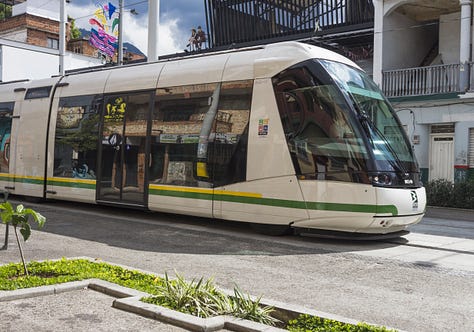



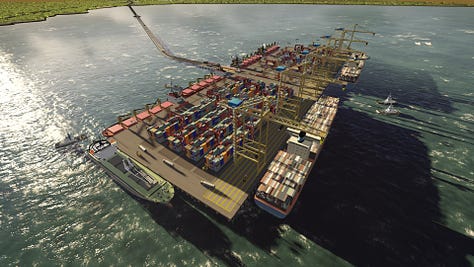
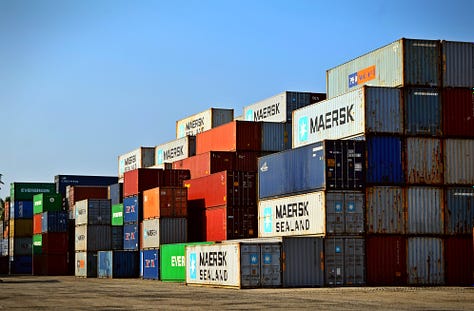


In recent years, the department of Antioquia has become a focal point for U.S. interests in the region, particularly in the northern tip of South America.
After years of strategic disengagement, the United States is finally making a comeback in Latin America. And Antioquia, Colombia, is uniquely situated to reap the benefits. Its strategic location and growing economy make it an ideal location for addressing regional issues and promoting economic growth.
Located in northwest Colombia, Antioquia, the country's second-largest department, has gained recognition beyond its capital city of Medellín.
Antioquia's economy, cultural significance, natural resources, and strategic location have the potential to transform this Colombian region into a landing pad for increased American involvement in economic and security issues.
Key factors contributing to this include:
Advances in Technology and Innovation.
Rich Agricultural Production.
Strategic Location for Trade.
Robust Security Cooperation with Antioquia and Medellín Authorities.
Similar Cultural Values, e.g., capitalism, self-determination, rejection of socialist ideals.
Abundant Natural Resources.
Let's explore why Antioquia is important and why its relationship with the United States is growing stronger.
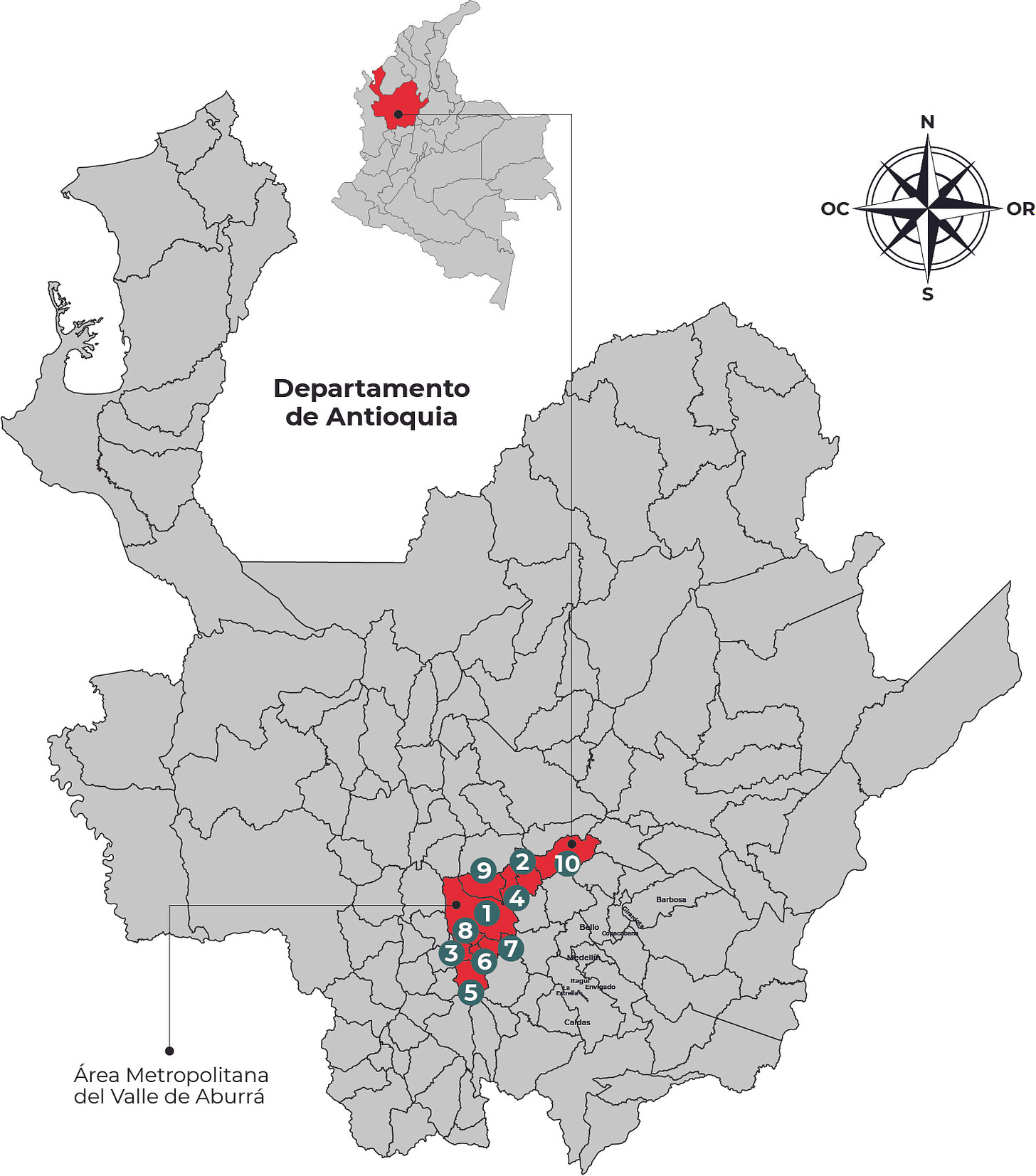
Medellín: A Center of Technological Innovation
Medellín has changed remarkably over the past few decades. It has transformed from a very troubled city into a place known for innovation and progress.
Key factors in this transformation include:
Ruta N: A technology center that supports entrepreneurship and innovation.
Attraction of Foreign Companies: Big companies like IBM and Hewlett-Packard have opened offices in Medellín.
Skilled Workforce: The city has lots of educated and talented workers. Many with international degrees.
University Partnerships: Local universities like the University of Antioquia and EAFIT University work with Western research institutions.
Medellín is establishing itself as a top tech hub in Latin America due to increased investment in education and innovation. This opens up opportunities for US companies looking to expand into new markets and recruit emerging talent.
The city has traditionally relied on a collaborative approach between the private sector, local government, and academia to overcome challenges.
The Strategic Port of Urabá
A seaport in Antioquia would greatly benefit Medellín, Bogotá, and the Coffee Region cities. Puerto Antioquia's location provides access to the Caribbean Sea, which is beneficial to international trade. This marks the first time Antioquia has a seaport on its territory.
The project is expected to create 17,000 new jobs. Approximately 800 new companies will be moving to the area. The value of land in western Antioquia and Urabá will probably increase. This new seaport will be prepared to handle 25% of Colombian exports and imports.
Infrastructure Connections
Puerto Antioquia will link with two major road projects, Mar 1 and Mar 2, part of Colombia's fourth-generation (4G) road network. The Toyo Tunnel, South America's longest, has been handed over to Antioquia for completion after initial setbacks.
Operational Timeline
First test ship arrival: December 2024.
Full operations start: Q1 2025.
Reduced Transportation Times
Up to 30% shorter shipping times between Colombia and the United States compared to other Colombian ports.
Shorter distances to seaports from major cities:
Bogotá: 33% shorter distance.
Medellín: 51% shorter distance.
Coffee Region: 40% shorter distance.
Cost Savings
Faster shipping results in lower costs for businesses.
With these developments, Urabá could become a major logistics hub in Latin America, making Antioquia an attractive partner for the United States.
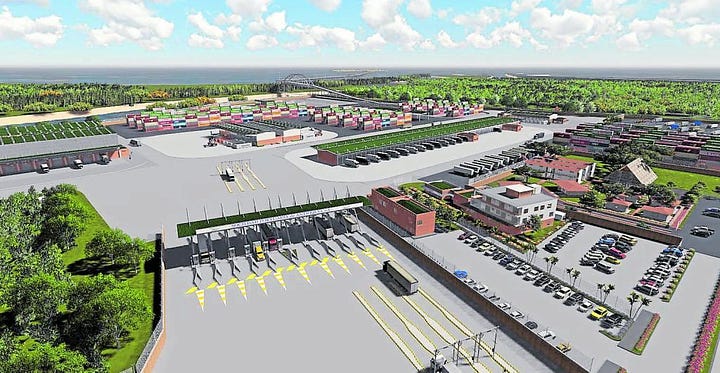
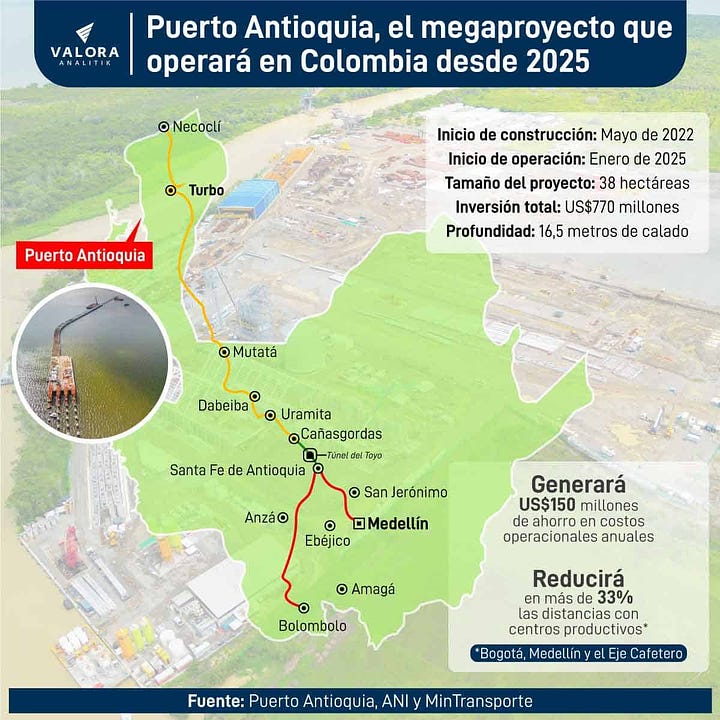
Antioquia's Agricultural Potential
Agriculture is very important in Antioquia and interests the U.S. market:
Leading Producer: Antioquia is a top producer of flowers, avocados, bananas, and coffee.
Flower Exports: About 40% of Colombia's flower exports come from Antioquia, many going to the U.S.
Quality Bananas: U.S. companies invest in the supply chain to meet demand.
The completion of Puerto Antioquia is expected to boost Colombian agricultural exports, particularly those from Antioquia, by providing a more efficient and reliable route to international markets.
Natural Resources and Energy
Antioquia's natural resources draw interest from U.S. investors, especially in mining and energy:
Gold Production: One of Colombia's largest gold-producing regions.
Investment in Mining: Western companies are interested in gold extraction.
Hidroituango Project: A hydroelectric project with potential to generate substantial clean energy.
Foreign Investment and Economic Growth
Antioquia provides attractive opportunities for foreign investment, which stimulates economic growth:
Key Sectors
Manufacturing: Competitive labor costs and infrastructure
Technology: Innovation hubs and skilled workforce
Agriculture: Fertile land and strategic location
Services: Call centers, virtual assistants, and BPO (Business Process Outsourcing)
Growing Consumer Market
Expanding middle class fuels local consumption
American companies capitalize on rising demand
Emerging Opportunities
Real Estate: Local demand and expansion potential
Retail Development: Growing consumer base familiar with American products
Tourism Real Estate: Americans and foreigners invest in vacation homes, apartments, and land
Medical Tourism: World-class healthcare facilities and competitive costs attract international patients
Technological Advancements
Investment and innovation support a growing technology sector.
US Investment Trends
Increasing number of US companies operating in Antioquia
Demonstrated confidence in the region's economic potential
U.S. Interest in Antioquia's Tourism
The U.S. is increasing its focus on Antioquia due to its growing tourism potential.
Key Factors
Improved security and infrastructure, along with a strategic location for accessing Latin America, make Antioquia attractive.
Rising demand for cultural and authentic experiences.
U.S. Advantages
Antioquia's proximity to the U.S. and emerging business opportunities align with U.S. interests. Key sectors include:
Tourism and Hospitality.
Real Estate Development.
Innovation and Technology.
Cryptocurrency and Financial Technology (Fintech).
Security Cooperation
Security is an important part of the relationship between Antioquia and the United States:
Combating Drug Trafficking: Antioquia plays an important part in this effort. Some Antioquia regions have been at the center of large government operations against organized crime, such as 'Operación Agamenón I & II' in Urabá, which aimed to reduce the influence of the Clan del Golfo.
Combating Human Trafficking: Antioquia is a critical location for combating human trafficking due to its proximity to international borders like the Darién gap, making it a hub for trafficking routes. Efforts focus on identifying and disrupting trafficking networks.
Scopolamine and Crime Impact on Tourism: The presence of scopolamine and other substances poses a serious risk to tourists, harming Antioquia's growing tourism industry. US interests aim to support Colombian authorities in mitigating these threats.
Transnational Organized Crime: Medellín has historically been a hub for international criminals, including those from Serbia, Italy, Mexico, and the Middle East, sought by Interpol. Recent arrests have disrupted these networks, but continued cooperation is necessary to combat global organized crime.
Plan Colombia: Since the 1990s, the United States has invested in security infrastructure, offering training and resources. The incoming US administration's increased interest in Latin America has the potential to revive some of these efforts.
Strategic Location: Antioquia's access to the Caribbean and close proximity to the Pacific makes it key for intercepting illegal activities.
Shared Cultural Values
Antioquia and the United States share similar cultural values, including:
Capitalist Economy: Antioquia's right-wing governments strongly support free-market principles, aligning with US economic interests.
Self-Determination: The region's emphasis on personal freedom and autonomy resonates with American values.
Rejection of Socialist Ideals: Antioquia's leaders have historically opposed leftist ideologies, creating a favorable political environment for US cooperation.
This ideological alignment creates a solid foundation for:
Economic partnerships and investment
Cooperation on security and counter-narcotics efforts
Cultural exchange and tourism development
The shared values also facilitate dialogue and collaboration between Antioquia's leaders and US officials.
Conclusion
Antioquia is becoming a strategic hub for US interests in the region, particularly with the incoming administration. As a valuable partner, Antioquia presents numerous opportunities for cooperation in:
Technology and innovation
Agriculture and trade
Security collaboration
Tourism and cultural exchange
Natural resources and sustainable energy
Economic growth through investment



